Aboriginal elder Major Sumner condemns wombat stoning by SA police officer
Well-respected Aboriginal elder Major Sumner has denounced the stoning of a wombat by an SA police officer as “wrong” and showing “no respect” — as debate rages over whether the incident was a cultural practice or abhorrent act of cruelty.
National
Don't miss out on the headlines from National. Followed categories will be added to My News.
EDITOR’S NOTE: The Advertiser has chosen not to publish the most graphic aspects of this video. Some viewers may still find it distressing
- Petition calls for prosecution after wombat stoned
Tory Shepherd: What sort of person preens about killing a wombat?
A prominent Aboriginal elder has denounced the stoning of a wombat by an SA police officer on a remote SA road and called for laws to be strengthened so traditional hunting laws are not exploited.
Footage emerged on social media on Thursday of SA Police officer Waylon Johncock, who was off-duty at the time, stoning a wombat and laughing about it with a friend on the Far West Coast of the state.
Ngarrindjeri elder Major Sumner, 71, described the actions of Mr Johncock, the person filming the attack and anyone else who was in the car at the time of the incident as “wrong”.
“The way they went about it, it was just more of a joke, a fun thing for them,” he said.
“There’s no respect for that animal whatsoever.
“We didn’t hunt like that. We still don’t hunt like that.”
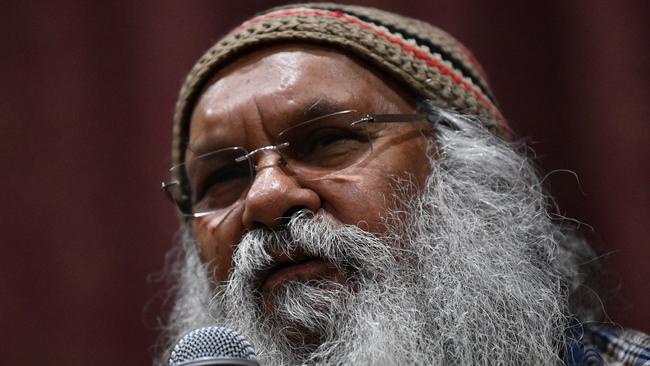
South Australian Premier Steven Marshall has also described the video as “disturbing” and Australia’s first Aboriginal Federal Cabinet member has labelled it “distressing”.
It comes as more than 135,000 people have signed a petition calling for a review of laws that allow traditional hunting and for Mr Johncock to be prosecuted.
The Wombat Awareness Organisation launched the online petition on Thursday, after the footage, which is now the subject of a police investigation, emerged.
Mr Sumner questioned the legitimacy of claims that the wombat was killed via traditional hunting methods, which are protected under South Australian legislation.
“If they’re saying it was hunting for food, you wouldn’t go and hunt a sheep like that (and) you wouldn’t go and hunt any cattle like that,” he said.
“That animal would be bruised up (and) it wouldn’t be good for you to cook or eat or anything.
“If you want to hunt something for food, it’s done in the most humane way and end their life straight away – it’s not a fun game for you.”
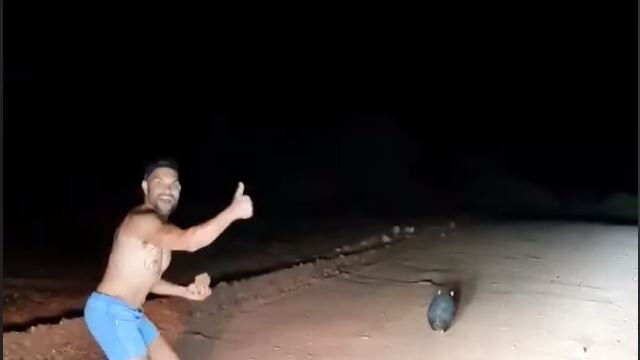
Mr Sumner said legislation needed to be strengthened to ensure that traditional hunting laws were not exploited.
He said the officer and anyone else involved in the wombat incident should be punished, and even made to do community service with animal welfare organisations.
“They shouldn’t just get off,” he said.
“Anyone who does anything like this shouldn’t just walk away from it.
“This is something that we need to stop.”
Mr Marshall, who is also in charge of the state’s Aboriginal Affairs portfolio, told The Advertiser he expected all police officers to act with “the highest level of integrity”.
“It’s disturbing to see any footage of people engaging in acts of glorifying cruelty towards animals,” he said.
“Taking animals is in line with Aboriginal cultural practice but I will not pre-empt the current police investigation by commenting further on whether what happened in this case was acceptable practice.
“In particular aboriginal culture is usually practised in private so I question the way in which what happened in this case has been disseminated through social media.
“The public dissemination of acts which glorify cruelty to animals is completely and utterly unacceptable and abhorrent.”
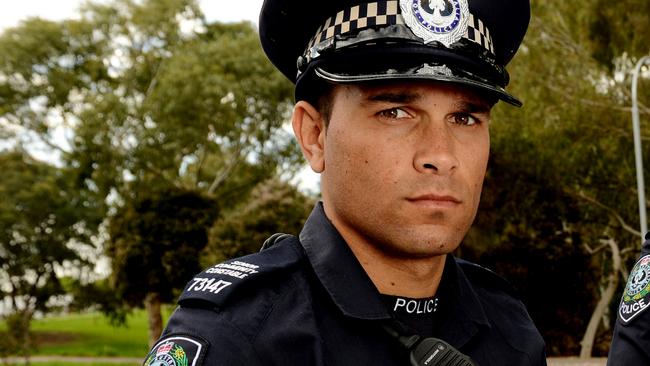
Mr Marshall said he would await the outcome of the police investigation before deciding if legislative changes were needed.
“Every piece of legislation exists in a dynamic environemnt ... but let’s just wait to see what this investigation shows,” he said.
Greens MLC Tammy Franks said the Greens believed legislation did need to be strengthened, in consultation with Traditional Owners and relevant communities, to avoid exploitation of traditional hunting laws.
“If a farmer culls a wombat, with a permit, there are permitted and prohibited methods,” she said.
“If an animal is killed for food using halal or kosher slaughter again rules apply.
“Traditional hunting, while lawful, should not allow gratuitous or prolonged pain and cruelty.”
SA Best MLC Frank Pangallo said he would discuss whether legislative change was needed with his party colleague Connie Bonaros and his Upper House colleagues.
“If that needs to be tightened to prevent (acts of animal cruelty) from happening, of course we need to look at it,” he said.
“You can’t use an Aboriginal rituals or customs as an excuse for a blatant act of animal cruelty.”
Federal Aboriginal Affairs Minister Ken Wyatt has also spoken out about the video.
“The footage of the incident is clearly distressing,” he told The Advertiser.
“It is important that the proper authorities to investigate the incident,” he said.
Animal welfare organisation PETA issued a statement on the incident on Friday morning.
“A police officer who smiles as he pelts a living, feeling being to death should not only be struck off the force but also be locked up,” spokeswoman Emily Rice said.
“We must treat all acts of violence with the seriousness that they deserve. Otherwise, we risk endangering the lives of both animals and humans.”
The graphic video of the incident shows a car following a wombat along a dirt road before a man wearing a backwards baseball cap and shorts gets out of the vehicle and gives the camera a “thumbs up”.
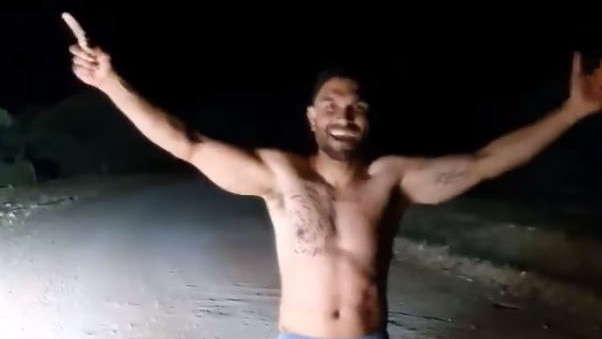
He then launches his attack on the animal, picking up a rock from the road and hurling it at the creature from just metres away.
The wombat tries to flee but the man chases it and throws more rocks at it. His friend can be heard saying: “Get him, get him, kill him.”
The wombat tries to escape again but the man pummels it with more rocks until he stops running. The last blow in the video shows the wombat being hit in the head at close range, stumbling and rolling over.
“First man I’ve ever seen kill a wombat on foot, bro,” the friend says.
Mr Johncock is well-known within the football community, having played in the SANFL with Glenelg. He plays for Koonibba, near Ceduna.
He had been working for SA Police for 10 years as a Senior Community Constable and is based in a remote community on the Nullarbor.
NITV reported Mr Johncock helped non-indigenous officers understand the social and cultural issues within the community to help bridge the gap between indigenous people and police.
“Because I have a basically grasp of the Pitjantjatjara language, I’m able to assist my mainstream member who I’m working with to communicate,” he told NITV News.
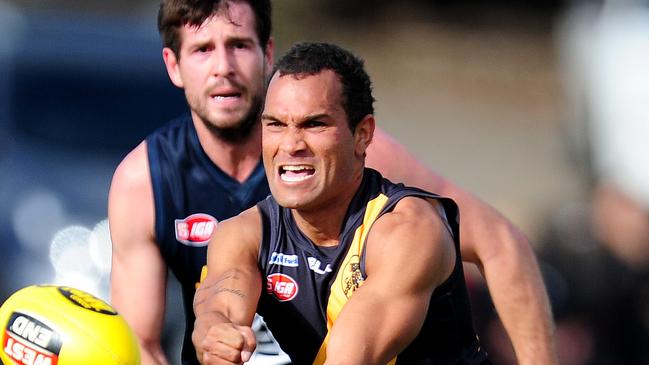
SA Police Commissioner Grant Stevens confirmed the man in the video was a police officer and the matter was the subject of an investigation.
“I find the actions portrayed in the footage to be totally abhorrent and unacceptable,” Mr Stevens said.
“I am aware of the community outrage regarding this matter. I want to reassure everybody that the actions in the video do not align with the values and behaviours I expect from my employees, nor does it align with community standards.
“Numerous employees of South Australia Police have also expressed to me that they, too, find the footage detestable and not consistent with their values.”
SA Police released a statement on Friday afternoon saying its Internal Investigation Section is continuing it’s inquiry into the matter.
“The investigation is progressing as a matter of urgency and SAPOL continues to treat this with the utmost seriousness,” it read.
“The final outcome will take some time to complete. SAPOL will provide an update as soon as possible early next week.”
An Aboriginal leader told The Advertiser throwing rocks at wombats was a traditional hunting practice – but he did not condone the action if it was used for sport.
Far West Coast Aboriginal Corporation chief executive John Buckskin said some people in the Aboriginal community used guns to hunt for food, while others still adhered to “old methods” and used “whatever is available” to them. “Some of these traditional practices may not be seen as appropriate in the European (culture),” he said.
“If it’s not for hunting, and it appears to be for sport, then it’s not appropriate.
“In my opinion, I wouldn’t condone killing for sport. If it appears to be for sport, there are laws against animal cruelty to deal with that.”
Kaurna elder Jeffrey Newchurch told ABC Radio Adelaide that Mr Johncock was a good man who didn’t deserve to be “crucified” and turned into a “scapegoat”.
“We will always make mistakes, Aboriginals and non-Aboriginals,” he said.
“This has been highlighted where maybe it’s gone out of the context, but to have 120,000 signatures signed against us, Aboriginal people, is what was done to us at the start of colonisation, where bang, ‘we don’t like what the Aboriginal people do, you come be a Christian’.”
He said calls for Mr Johncock to lose his job were “cruel”.
And Wirangu-Kokatha elder Jack Johncock, told the ABC, that using rocks to kill a wombat was one of the traditional hunting methods used by local Aboriginal people.
“It’s easy for people to sit back and judge people,” he said.
“For the people of the west coast of South Australia, the wombat is a big part of their diet and they’ll get wombat any way they can.”
Originally published as Aboriginal elder Major Sumner condemns wombat stoning by SA police officer

